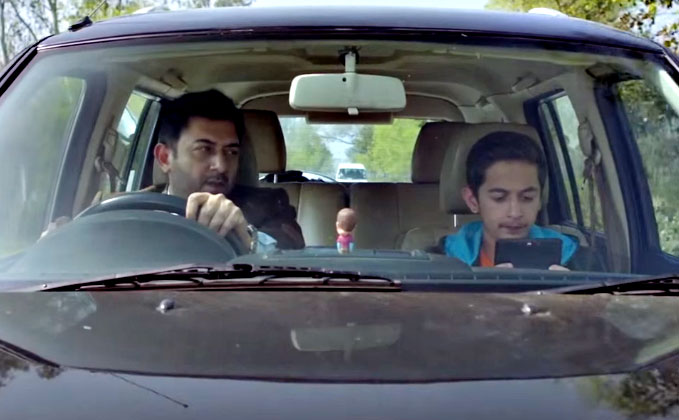Director: Tanuj Bhramar
Cast: Arvind Swamy, Aman Uppal, Himanshu Sharma
Dear Dad – which could well become ‘Dead Dad’ if autocorrect betrays you or you’re not careful on a keyboard – is the kind of film you really want to like. It operates on a one-line story: A father (a returning Arvind Swamy, as Nitin) and his teenaged son (Himanshu Sharma, as Shivam) embark on a confession-filled, conflict-ridden and somewhat life-altering road trip from Delhi to Doon School (Dehradun). The music is breezy, the shots unglamorous, the issue sensitive, the restricted aspect ratio more “indie” than usual, and the melodrama is internalized — almost forcibly at times — instead of exploding on screen.
In short, this film does little wrong. But does that automatically make it a good film?
Not quite. Its strength – that of utmost simplicity and ‘smallness’ – is also its glaring weakness. For what one calls a coming-of-age drama, Dear Dad plays out like a boring old straight line.
Without giving too much away, let’s say Nitin has to tell his son that he is not his father; he is a cookie monster. Nobody likes cookie monsters, especially in India, where monsters are looked down upon and cookies are sources of bodily corruption. He discloses this devastating condition fifteen minutes into the film. Straight down to business, then. I suspect Shivam is angrier because he overhears his father’s revelation, instead of being addressed directly. So, a boy finds out that his father isn’t who he said he was.
The next 75 minutes are all about how the boy switches across varying degrees of hatred and repulsion for the Cookie Monster. You know exactly how it’s going to end, because time and space heals everything. And because nothing is permanent when it comes to sulking, brooding Indian families.
Actually, I don’t know why I’m using juvenile metaphors. A father takes his son on a road trip to tell him that he is gay. Arvind Swamy does this with utmost elegance, but one always feels that he’s holding back, much like the film he’s occupying.
The flavours can only come in with the handful of supporting characters planted into an intimate story: A hitchhiking reality-tv star (Aman Uppal; not bad; look out for his body language when he finds out about the father’s ‘condition’), fleeting grandparents, the progressive wife who knows everything – an equation which, I must say, is maturely handled – and a flirty school principal. Roadblocks are inserted (literally) in the form of a timely landslide, and an essential all-nighter at a lodge.
The obvious generation gap serves as a father’s gentle initiation into his boy’s universe: Nitin talks about everyone’s favourite childhood video game ‘Donkey Kong’ and reminisces about floppy disks and cheat codes, while his son plays a snazzy new cellphone game. Deep inside, one can’t help but sense Shivam’s nagging resentment that he lives in a boarding school. Maybe he could have ‘stopped’ his father from becoming this if he were allowed to stay at home.
There’s an off-kilter and tone-breaking Bengali Baba sequence that exists solely to offer unnecessary comic relief. Here, the film becomes that sincere frontbencher being forced to “fit in” by doing silly things for the popular guys. All throughout, though, Dear Dad doesn’t feel like it is essentially a crucial phase of someone’s life; it feels as if the film has been made around this phase, and that there was nothing before and after this stretch. It would have been interesting to hear how Nitin himself came to terms with being a Cookie Monster (don’t roll your eyes), or if there are more of his breed. If you get the gist (you will, if you’ve watched the trailer or the movie by now).
Swamy, he of the Roja and Bombay fame, is likeable as mentioned earlier, but I suspect he hasn’t really elevated his character from paper to screen. Shivam seems to be perpetually walking away from him in every frame. It gets a little annoying. I understand how traumatic it is for a conflicted kid his age to process the sweeping changes ahead of him. But even his unpredictability and mood swings are a bit predictable in context of the film’s one-act structure. He will never quite have a resolution of sorts, but the ice-breaker devices — like a girl he is crushing upon, or the stern principal — aren’t out of the ordinary. Nothing ever is.
Even though it means well, I can’t even end the review by saying that Dear Dad could have been so much more. It couldn’t have. The notion of what it’s conveying is ambitious, but the storytelling isn’t. It started and ended with a single line. It doesn’t use its medium ambitiously, and is way too ‘safe’ — ironic, given its brave protagonist.







Leave A Comment
You must be logged in to post a comment.